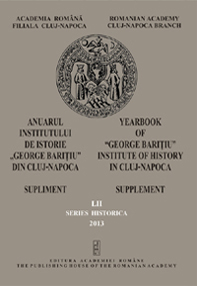Credinţa episcopului Ioan Inocenţiu Klein
Bishop Ioan Inocenţiu Klein`s Faith
Author(s): Radu NediciSubject(s): History
Published by: Editura Academiei Române
Keywords: confessional identity; Greek Catholic Church; Transylvania; Latin rite; Holy Office; historical memory;
Summary/Abstract: Historical research hailed Inocenţiu Klein as an exceptional figure of the Romanian nation in 18th century Transylvania and focused consequently on his political, cultural and educational initiatives. Comparatively, very little is known about his personal faith, although a long historiographical tradition saw him as one who could transcend the religious divisions brought by the union with Rome in 1701. The present study aims to challenge this common image. A former Jesuit student, Inocenţiu Klein spent his entire youth in a Catholic environment and was deeply influenced by the Society’s spirituality. The College of Cluj and the University in Trnava prescribed no separate treatment to the Oriental Catholics enrolled there at the time. The fact that in 1726 he wanted to become himself a Jesuit is eloquent for this period in the future bishop’s life. His nomination to head the Greek Catholic Church in Transylvania blocked the way to a full conversion, but leaved intact his opening towards the Latin rite. Two requests addressed to the pope in 1735 and 1743 demanded the permission to celebrate Mass according to the Roman Missal. After heated debates in the offices of the Curia and an initial rejection, the dispensation was finally granted by Benedict XIV. This whole episode suggests a necessary reappraisal of Bishop Klein’s threats to abandon the ecclesiastical union together with the Church which he shepherded, as well as his long fight against the Jesuit theologian, in terms not of religious choice, but of political pressure put on the imperial administration. The very personal manner in which Ioan Inocenţiu Klein combined a Catholic devotion with the compliance to the functions he exercised as bishop of a Byzantine rite Church corresponds to a certain stage in the development of the Greek Catholic identity, before the confrontation with the Orthodox polemists meant a more conservative stance had to be adopted.
Journal: Anuarul Institutului de Istorie »George Bariţiu« - Series HISTORICA - Supliment
- Issue Year: LII/2013
- Issue No: LII/Sup
- Page Range: 139-158
- Page Count: 20
- Language: Romanian

